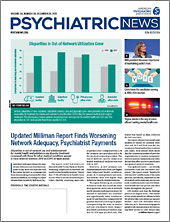I am a psychiatrist living with bipolar disorder and am responding to the column in the November 15 issue by APA President Bruce Schwartz, M.D., focusing our attention on physician health.
My journey toward self-acceptance and public acknowledgement has been a long one, fraught with worries about professional consequences and fears of collegial disapproval. In addition to these external realities, I felt deeply ashamed to have a mental illness compelling me, a psychiatrist, to receive psychiatric care. Despite these concerns and hurdles, I’ve opted to step forward, hoping that there is a greater good in doing so.
I can understand why my colleagues remain untreated, despite the terribly high price paid in morbidity and mortality. I shunned treatment for far too long to the detriment of those around me, including my patients. Avoidance of care arises because repercussions are real and occur in a culture that maintains a status quo of secrecy and silence. Though we are excellent caregivers to our patients, it has been challenging for us to focus on helping our colleagues in need.
I stand on the shoulders of those trailblazers who have come before me to let others know that they have been ill; I have benefited greatly from them. My world has changed in the most important ways because I am now well. I have no doubt that we can find ways to aid those among us who need care. What concerns me is that the necessary dialogues to do so aren’t yet happening, but I believe that we can shift the culture one conversation at a time.
That those who have mental health conditions are required to step forward and engage in treatment to feel better is true, but that doesn’t absolve the rest of us from doing what we can to make their journey a safer and easier one. We have an obligation to move beyond our own discomfort and disrupt the current unhelpful stasis. Those working by our sides need us more than we likely realize. I have no doubt that we underestimate how impactful our words or a hug might be.
For those who continue to suffer in silence, lost in scary places, please don’t underestimate the welcoming and affirming response that you may receive if you allow well-chosen ones to truly know you. I have received more hugs and affirmation when I have told colleagues that I have bipolar disorder than I could have ever imagined. I speak from experience when I say that authenticity is powerful and freeing. You deserve to feel better. It is your right. Many, like me, have walked your walk with you. Please know that you are not alone. ■
JOHN BUDIN, M.D.
Stockton, N.J.
